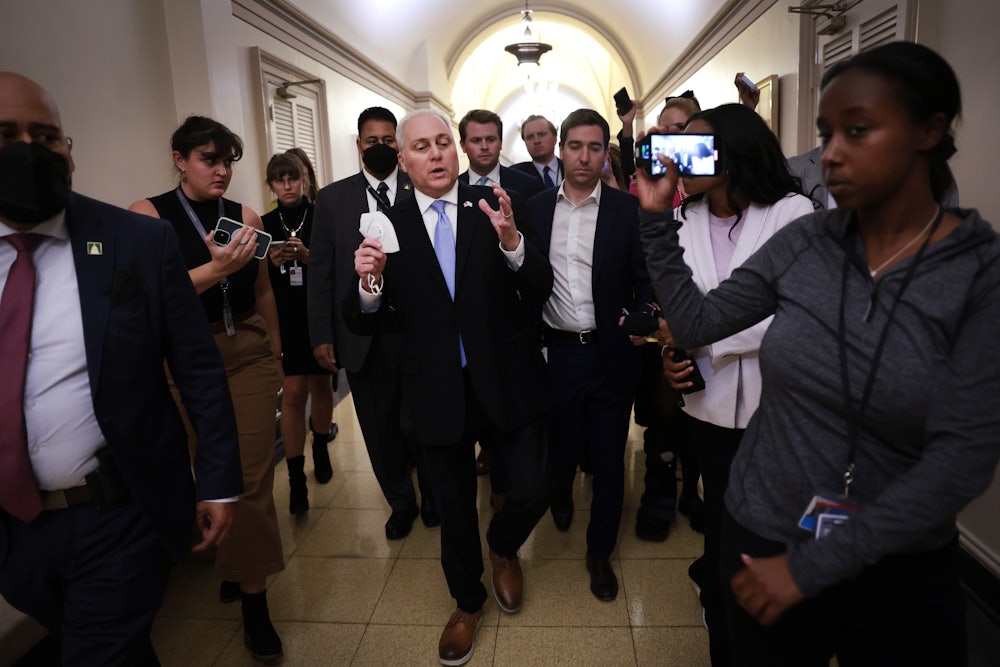On a bright Thursday morning, visitors filtered through the foyer before the speaker’s office. Led by red-jacketed tour guides, the headphone-wearing tourists glanced with vague interest, some even halting the flow of traffic to take photos of the sign above the leadership suite. In case you’re wondering, Kevin McCarthy’s name is still emblazoned over the entryway to the House speaker’s office. It’s a relic of an earlier era, when the House actually had a speaker—last Tuesday morning, to be precise.
“Time for a change,” an older man joked to the two Capitol Police officers guarding the entryway, pointing to the outdated sign above the door. (While no longer speaker, McCarthy is still squatting in the office for the time being.) Another tour guide, a young congressional intern, pointed her charges to the small cadre of bored reporters pressed against the back wall of the foyer. “This is, like, a workplace,” the intern told the family quietly trailing her like ducklings.
Well, although it was like a workplace, the House of Representatives on Thursday lacked one of the necessary preconditions for a functioning office: namely, a boss. McCarthy was unceremoniously booted from office last Tuesday, the first speaker to ever lose a rare vote of no confidence known as a “motion to vacate”—instigated by recalcitrant members of his own conference and abetted by every single Democrat in the House. Acting Speaker Pro Tempore Patrick McHenry is now the unhappy gavel-wielder. His powers in the role are limited; his primary function is to preside over the next vote for speaker. Exactly when that vote will occur, and who Republicans will elect, remains more of a mystery.
The sense of uncertainty threatened to tip over into outright chaos on Thursday night, as Majority Leader Steve Scalise—who was nominated by Republicans to be McCarthy’s successor after a fraught, hours-long meeting the day before—announced that he would no longer seek the speakership. The math was simply not in Scalise’s favor: Of the 99 Republicans who had supported Representative Jim Jordan for the speakership, several were unwilling to trade their loyalty to Scalise.
“It wasn’t going to happen. It wasn’t going to happen today, wasn’t gonna happen tomorrow,” Scalise told reporters. “Our conference still has to come together and we’re not there. There are still some people that have their own agendas.”
Scalise’s announcement came after Republicans met for nearly three hours earlier on Thursday afternoon.
“Frustration is really high,” Representative Dusty Johnson told me as he walked into the Republican conference meeting. “People don’t send us here to play silly leadership games. They sent us here so that we can pass laws and govern the country, and we have been unable to do that for a couple of weeks. We have to get our act together.”
The hallway outside of HC-5, the meeting room of the House majority, is like the Thunderdome for congressional reporters. But instead of a spacious arena, it’s a narrow passageway in the basement of the Capitol building, as if a real office complex vomited up a dank facsimile of itself with sickly beige walls, exposed pipes in the ceiling, and grayish concrete floors. As the meeting began, some Republican lawmakers bravely attempted to walk down the narrow strip of hallway unmolested. Others embraced the glaring lights of studio cameras and endured the shouted questions from the roiling mass of reporters, a many-armed creature of gnashing teeth and cell phones held aloft.
The Republican sentiment on Thursday varied from improbable joviality (Representative Tom Cole telling me he felt “outstanding”) to mild optimism (Representative Andy Ogles saying, “This is great for the American people to see how government works”), to barely concealed annoyance (Representative James Comer telling me that “it’s unfortunate we’re in this situation”). Representative Glenn Thompson, one of the more measured members of the conference, lamented to me that “there’s a handful of folks that don’t play well with others.”
“There’s a lot of work that we should be doing. We should be well beyond completing this speaker election process, and they’re holding up the work of the American people. And frankly, I hope the folks back home hold them accountable,” Thompson told me.
At least one of those eight Republicans who voted to oust McCarthy has no regrets. Representative Tim Burchett told reporters that he “followed the rules” in voting on the motion to vacate, adding that he “didn’t come here to make friends.” When I asked whether other Republicans were frustrated with him, the Tennessean deadpanned: “Oh, yeah. I check my car before I turn it on to go home. I’m looking underneath for wires.”
As Burchett chatted with reporters, another Republican swiped at him as he walked by. “Yeah, keep talking,” the representative cracked.
The vibes in the like-a-workplace continued to curdle as Thursday dragged on, even inspiring muddied television analogies from the last decade.
“It was an episode of Veep, and now it’s turning into House of Cards,” Representative Nicole Malliotakis—who, perhaps not coincidentally, is a millennial—said. “I’m getting frustrated about everybody being petty with their reasons when we have a government to run.”
Republicans slowly trickled out from the meeting as the afternoon ticked by, demeanors grim. Lawmakers despaired of holding a vote in the near future, and were skeptical that Scalise could garner the necessary support. When I asked Representative Darrell Issa what the mood was like in the conference room, he paused for a second before replying: “Not good.” Representative Byron Donalds characterized the atmosphere as “tense,” telling me that “a lot of our members are frustrated.”
“If you see smoke, and it’s not the speaker,” Representative Ronny Jackson told reporters, “someone just set the House on fire.” (That, or Cole has partaken in smoking one of his trademark cigars.)
Drastic times may call for drastic measures. Representative Troy Nehls called the Republican conference “broken,” suggesting that only one man may be able to breach the divide: former President Donald Trump.
“If we’re sitting here Sunday or Monday, and we’ve exhausted all our options, why wouldn’t we bring in Donald Trump?” Nehls asked. He continued that one member had said in the meeting that “the Lord Jesus himself” couldn’t get 217 votes. (It’s unclear whether Trump would have more of a chance than the Lord Jesus himself; unlike Trump, Jesus isn’t unpopular in swing districts.)
Republicans continued to meet throughout Thursday, in smaller groups in Scalise’s office, and for a larger confab as a conference later in the evening. There were vague talks of installing a temporary speaker, or expanding McHenry’s power as acting speaker pro tempore.
“I am deeply disappointed in the place that we are in at this moment,” Representative Marc Molinaro said on Thursday afternoon. “I lived through a divorce. I don’t blame one side of the conversation. This is a production that was bound to happen, sadly … but this is a bit of a crisis of our own making.”
* This article has been updated.










